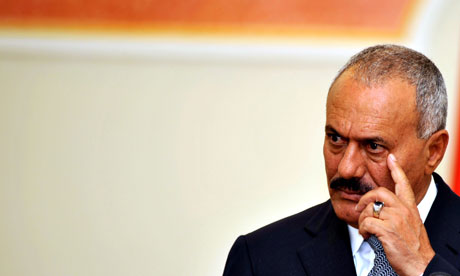* Comment is free Yemen's Ali Abdullah Saleh resigns – but it changes little The president's regime, and all it stands for, remains intact. What Yemen needs is a more effective parliament
Yemen needs is a more effective parliament
- Article history

After 33 years in power, nine months of deadly street protests calling for his resignation and weeks in hospital recuperating from a bomb attack on his palace, Yemen's Ali Abdullah Saleh finally signed away his presidency on Wednesday. He had come close to signing several times before – only to back off at the last moment.
Exactly what induced him to do the deed on this occasion is still unclear but the grisly fate of Muammar Gaddafi in Libya may have helped to focus his mind, along with international pressure. Yemen expert Ginny Hill suggests that a UN resolution approved unanimously by the security council last month may also have paved the way. The resolution, in effect, called on Saleh to go (it urged him to accept a transition plan hammered out by the Gulf Co-operation Council) and called for progress reports at 30-day intervals.
Just as the first of these reports was due, Saleh showed an increasing willingness to sign. Had he not done so, it's likely that the security council would have begun moving towards sanctions – starting by freezing the assets of Saleh and some of his immediate entourage.
Faced with the choice between a possible asset freeze and a promise of immunity from prosecution in the GCC deal, Saleh has opted for the latter. But although he has signed, he hasn't quite gone yet. He will nominally remain as president until a successor is elected, while the vice president – in theory at least – assumes all his powers. There are also rumours that Saleh may be bundled off abroad again for more medical treatment, this time to the US rather than Saudi Arabia.
Will this be enough to calm the situation on the ground in Yemen? Many are doubtful. Vice president Abd al-Rab Mansur al-Hadi is a fairly weak figure who lacks a significant support base, either in politics or the military. At the same time, Saleh's numerous relatives continue to hold key positions from where they can manipulate the strings on his behalf.
If his relatives start causing trouble again – as they did during his absence after the bomb attack – Saleh will claim his country needs him again, because he is the only person who can rein them in. Even at this late stage, a further comeback attempt by Saleh cannot be ruled out.
According to the plan, though, Hadi will press ahead with forming a government of national unity ahead of an early presidential election – supposedly to be held 90 days from now. Rather than creating a breathing space, this could easily trigger a new power struggle as would-be presidents (conceivably including Saleh's son, Ahmed) jostle for position.
More generally, this emphasis on the presidency does not bode well because what Yemen really needs is a more effective parliament and a less powerful president. Ideally, there would have been a new constitution in place limiting presidential power before the installation of Saleh's successor but that seems unlikely to happen and curbing a new president after the election will be more difficult.
In the meantime, parliamentary elections are long overdue. They were supposed to have been held in April 2009 but parliament's term was extended for a further two years. The postponed elections failed to materialise again in April this year – ostensibly for technical reasons, though the turmoil in the country also made holding them impractical.
The upshot is that even without Saleh, Yemen still has a parliament in which Saleh's party, the General People's Congress, holds an overwhelming majority. It is a parliament with no real mandate and very little legitimacy, yet it is also the body charged by the constitution with the task of approving candidates for presidential elections.
Saleh may be on the way out but his regime – and everything it stands for – is still very much in place. That is basically what the GGC states were hoping for with their so-called transition plan: change at the top while preserving the status quo beneath.
There are parallels here with Egypt where the fall of Mubarak left key parts of his regime intact, as the protesters there are now discovering. For Yemenis who want real change, the struggle is far from over.

No comments:
Post a Comment